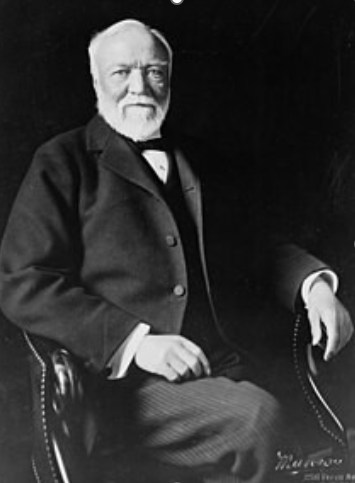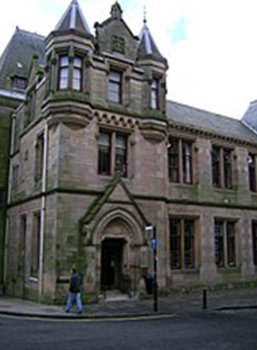The man who gave away Libraries – Andrew Carnegie (1835-1919)
Andrew Carnegie was born poor in 1835 in Dunfermline, Scotland. He went to a school set up by a philanthropist, and was encouraged by his uncle to read and memorise poems and historical stories. His parents emigrated to Pittsburgh, Pennsylvania, USA when he was 12. There he worked 12-hour days, first as a bobbin boy in a textile mill and later as a telegraph boy. He educated himself by borrowing books from the library of Colonel J Anderson who opened his personal library to working boys.

By the 1860s Carnegie had investments in railroads, railroad sleeping cars, bridges and oil derricks. In the 1870s he founded his first steel plant and built an empire that in 1901 he sold for $480 million which is worth $13 billion today. The sale made Carnegie “the richest man in the world”.
Carnegie had no intention of sitting counting his money, with a motto of “the man who dies rich, dies disgraced”. Already a philanthropist, he now began to make serious work of giving his money away. Carnegie funded retirement pensions for teachers, established the Carnegie Institute of Technology (later Carnegie-Mellon University), and set up scientific research centres and organizations devoted to world peace (he funded the building of the Peace Palace in the Hague). He also furnished towns across the globe with everything from music halls and swimming pools to church organs.
Carnegie had started endowing libraries in the 1880s – the first being in his birthplace, Dunfermline followed by several in his adopted state of Pennsylvania, all places where he had personal or business connections. After his retirement from business, he set up a streamlined process and eventually underwrote libraries around the (mainly) English-speaking world. He always provided the money to build the library but expected a commitment to maintaining it and providing the books.
A total of 2,509 Carnegie libraries were built between 1883 and 1929, including some belonging to public and university library systems. 1,689 were built in the United States, 660 in the United Kingdom and Ireland, 125 in Canada, and 25 others in Australia, South Africa, New Zealand, Serbia, Belgium, France, the Caribbean, Mauritius, Malaysia, and Fiji.

“A library outranks any other one thing a community can do to benefit its people. It is a never-failing spring in the desert.”
